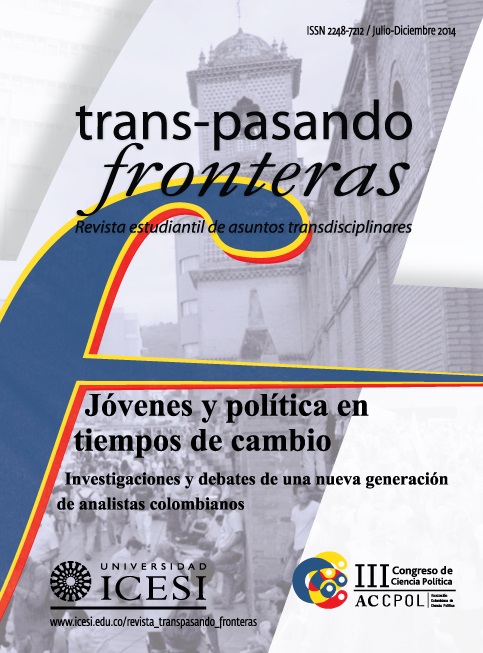Public security policies in Medellin: readings about problem of in-security from the perspective of human security?
DOI:
https://doi.org/10.18046/retf.i6.1867Keywords:
Public policy, Security, Human security, Problems of insecurity,Abstract
This article presents the main findings and interpretative proposals of the investigation: “Analysis of public security policy implemented by the municipal administration of Medellín, 2012-2013”. It begins by situating the analytical proposal of human security from below, a methodology which includes the interpretation of communities in Medellín affected by municipal government policies dealing with problems of insecurity. The most important research findings are then presented through three central ideas: firstly, the approach of the municipal government to the concept of human security, with findings demonstrating the discourse of a more mainstream and restricted approach to security; secondly, a divergence between government and communities in the definition of the problem of insecurity; and thirdly, the consequences for assuming a restricted focus in understanding and dealing with the problem of insecurity in Medellín. Finally, based on these findings, this article presents a number of general recommendations for insecurity intervention policy in the city.
Downloads
References
ALCALDÍA DE MEDELLÍN (2012b.). Plan Integral de Seguridad y Convivencia 2012-2015. http://www.medellin.gov.co/irj/portal/ciudadanos?NavigationTarget=navurl://81f0b832072cf638c5f853401a3e1070
ALCALDÍA DE MEDELLÍN (2012c.) Decreto 0495 del 2012 http://www.medellin.gov.co/irj/go/km/docs/wpccontent/Sites/Subportal%20del%20Ciudadano/Convivencia%20y%20seguridad/Secciones/Normas/Documentos/2012/Decreto%200495.pdf
COBB, W. y Elder, D. (1996). Formación de la agenda. El caso de la política de los ancianos. En L. F. Aguilar Villanueva, problemas públicos y agenda de gobierno (págs. 18977-104). México: Miguel Ángel Porrúa.
OSHM - Observatorio de Seguridad Humana de Medellín, (2012) control territorial y resistencias: una lectura desde la seguridad humana, Medellín, La carreta editores E.U., pp. 81-115.
PEREZ DE ARMIÑO, K. (2007). El concepto y el uso de la seguridad humana: análisis crítico de sus potencialidades y riesgos. En: Seguridad Humana: conceptos, experiencias y propuestas. Revista CIDOB D’AFERS INTERNACIONALS (76). Fundación CIDOB: Barcelona, Diciembre-enero.
PERSONERÍA DE MEDELLÍN (2013). Informe sobre la situación de los derechos humanos en la ciudad de Medellín 2012.
PERSONERÍA DE MEDELLÍN (2014). Informe sobre la situación de los derechos humanos en la ciudad de Medellín 2013.
PINZÓN, E. M. R. (2009). “Las narrativas de los conflictos y la construcción de un enfoque de la seguridad humana. Análisis crítico del caso de Colombia”. En: Revista CS, núm. 3, 125-146. Cali: Universidad Icesi
MAGAÑA HERNÁNDEZ, D. M. (2009). El otro paradigma de la seguridad. En: Alegatos (72). México, mayo-agosto, (Pp. 127-150).
MEJÍA MOLINA, D. C. (2009). “Efectos para Colombia de los debates en torno a la seguridad del Estado y a la seguridad humana”. En: Revista CS, núm. 3, 109-123. Cali: Universidad Icesi
Fuentes normativas
Concejo de Medellín. (12/05/2012) acta 070. Disponible en: http://www.concejodemedellin.gov.co/ Fecha de consulta: 13 de julio de 2013.
Entrevistas
Entrevista a lideresa comuna 8, noviembre 5 de 2013.
Entrevista grupal a líderes Comuna 13, octubre 23 de 2013.
Entrevista a lideresa Comuna 13, octubre 29 de 2013.
Entrevista a líder comuna 8, octubre 15 de 2013.
Entrevista a Sandra María Bedoya. Promotora Local de Gobierno Comuna 13. Secretaría de Gobierno y Derechos Humanos, octubre 28 de 2013.
Downloads
Published
Issue
Section
License
Trans-pasando Fronteras provides immediate open access to its content on the principle that making research freely available to the public supports a greater global exchange of knowledge.
© Authors hold copyright and publishing rights without restrictions but in accordance with the CC license.
All the material in this publication can be reproduced as long as reference is made to title, author and institutional source.







